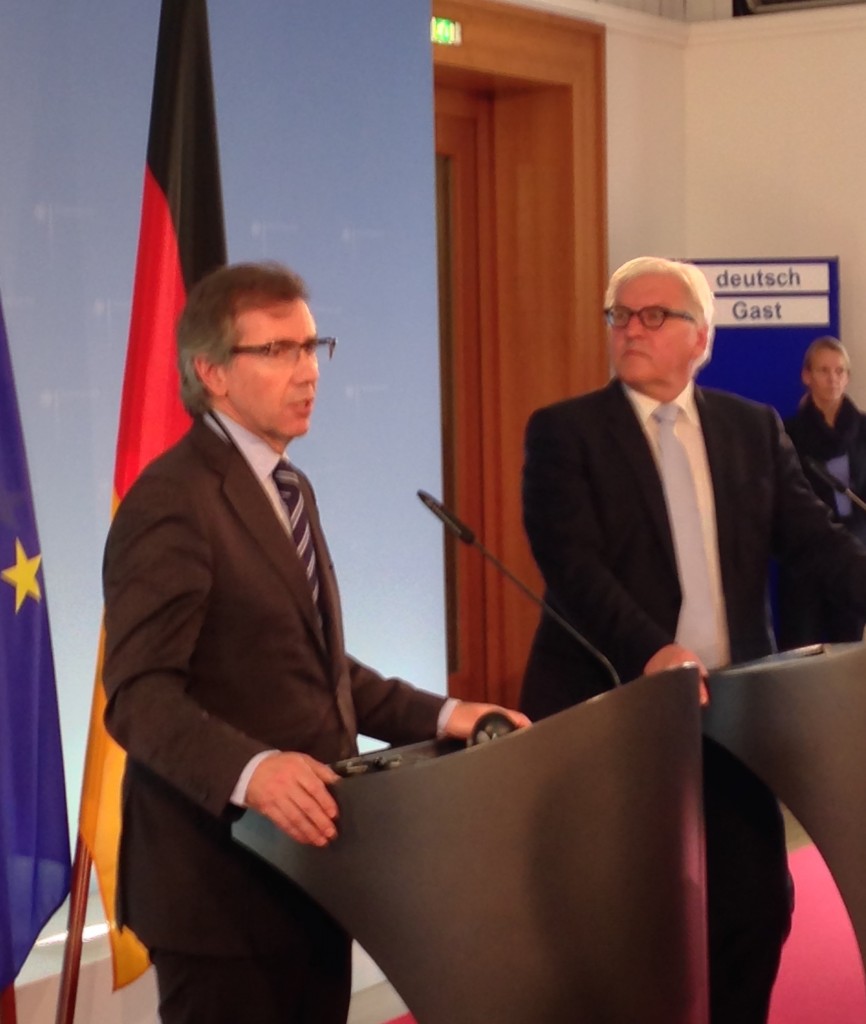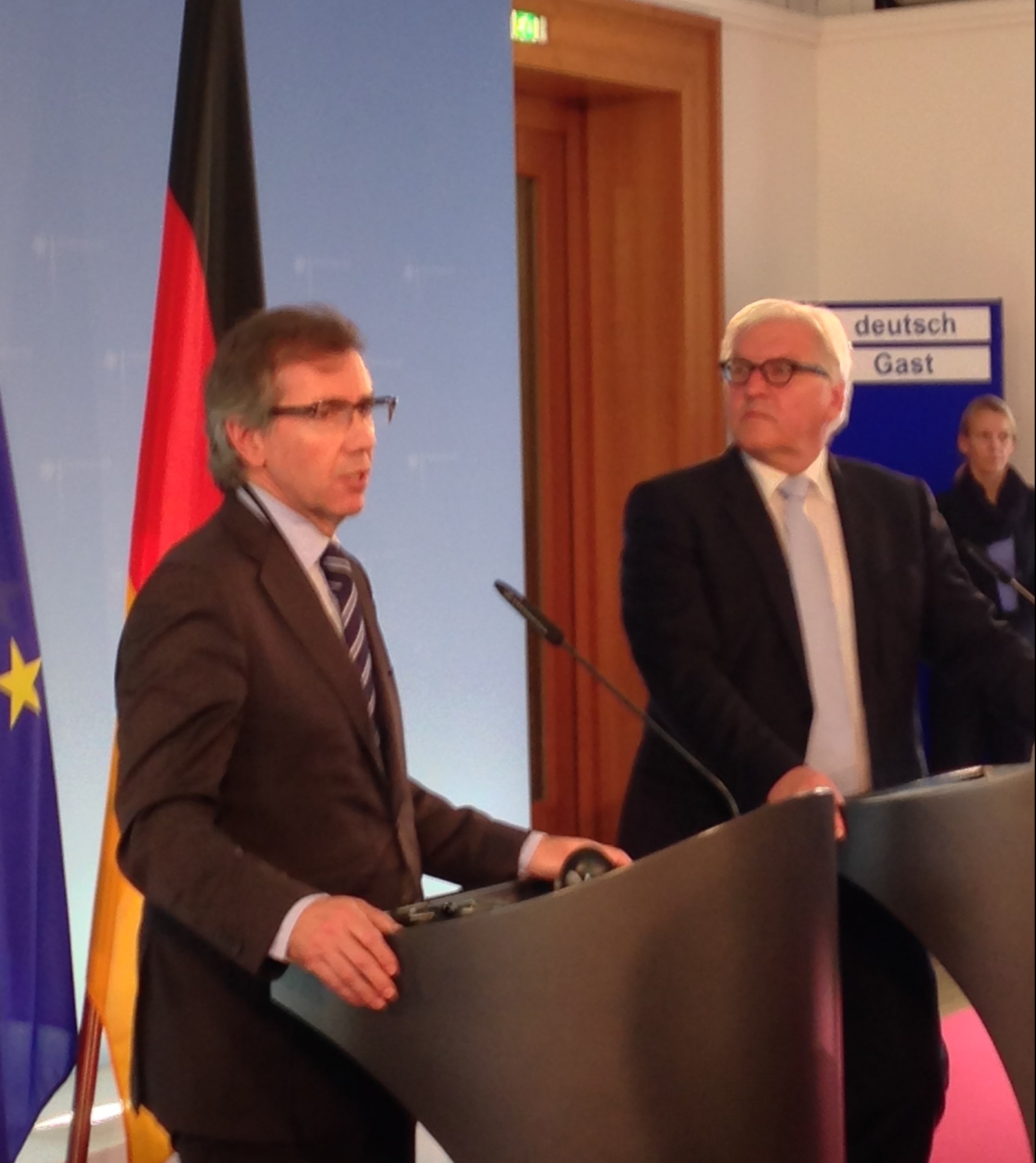By Libya Herald staff.

Berlin, 11 June 2015:
For the first time, both sides in the UN-brokered Libya Dialogue process sat down at . . .[restrict]the same table to negotiate yesterday in Berlin where officials from France, Germany, Italy, Spain, the UK, the US and the EU as well as Russia and China, pressed them to accept the latest draft agreement.
It was announced on Monday and has provoked considerable hostility among a significant number of House of Representatives (HoR) members who say it is a complete change to Draft No 3 and that it rewards the continuing General National Congress at the expense of the HoR.
“This is a proposal that demands painful compromises from both sides,“ German Foreign Minister Frank-Walter Steinmeier told the press afterwards, German Foreign Minister, adding that there was “no more time for a fifth or sixth proposal”. This was the “last opportunity to prevent Libya from falling apart,” he said.
However, the meeting had been encouraging, he stated while also indicating that it had not been plain sailing. “We have tried to bring home to the parties that if there is no peace … that it will be the Islamic State that will be calling the shots”, he said
Both UN Envoy Bernardino Leon and the delegates agreed the atmosphere had been positive.
It made a big difference having the Russians and Chinese onboard the process, Leon said. It changed the dynamic and made it clear to Libyans that the entire international community backed it as the only way out of the Libyan crisis.
“The mood was good”, likewise said Nuri Elabbar, one of “G8” members of the Dialogue (the eight independents members participating). He hoped the draft would endorsed by both the HoR and the continuing General National Congress. “I think it [the HoR] will sign it,” he said, adding that if they did not his “G8” group would issue their own statement accepting it.
Former Deputy Prime Minister Mustafa Abushagur also said he was encouraged and thought that the draft would be accepted probably in a couple of weeks’ time.
The draft had to be accepted, Leon said, and hopefully before the beginning of Ramadan – although, with that just a week away, he added that it was “not a sacred deadline”. There were hardliners in both camps opposed to the agreement, he acknowledged, but the decision had to be taken urgently. The Islamic State (IS) was gaining in strength and there was also a cash crisis in the making. The Central Bank of Libya would soon be unable to pay civil servants, he claimed, because Libya was earning no money.
However, Taher El-Sonni, the special adviser to Foreign Minister Mohamed Al-Dairi who leads the support team for the HoR delegation said there would have to be changes before the HoR would accept the draft. “It will have to be fine-tuned,” he told the Libya Herald. “There was harmony between Drafts 1, 2 and 3. But there’s no harmony between 3 and 4.”
Two of the main changes needed, he pointed out, were the number of members of Congress being allowed to become members of the proposed State Council (a sort of Upper House for the Libyan parliament) and the continuing role of the Dialogue process members.
The figure of 90 seats in the State Council reserved for GNC members would have to be reduced, he said.
Secondly, the Dialogue delegates could not play a continuing role in the political system once they had named the Prime Minister and the two Deputy Prime Ministers.
Under Draft 4, they would not only name the three, which the HoR cannot reject, but also in consultation with five members each of the HoR and the State Council appoint their replacements should they resign or die, have the right to be consulted on the appointment of other ministers, and have the constitutional power to extend the government’s term of office beyond a year.
Several HoR members and supporters have complained that this effectively turns the Dialogue delegates into a third legislature.
With such amendments, it was possible that the HoR might agree the accord, El-Sonni said. But it would still be a short while before that could happen.
Whether the GNC would agree to a change in seats in the State Council remains to be seen. According to a diplomat close to the negotiations, the GNC negotiators had originally demanded 120 seats, and 90 was the compromise from Leon.
Meanwhile, after the meeting in Berlin, the officials from the eight governments and from the EU published their own statement saying that they also discussed the situation in Libya with representatives of Algeria, Chad, Egypt, Morocco, Niger, Sudan and Tunisia. They called on Libyan leaders “to agree now on a Political Agreement which provides for a general ceasefire, for inclusive political institutions, including a Government of National Accord and for interim security arrangements”. All Libyan parties should immediately stop all hostilities and “prevent all actions that may disturb the political process”. They also said they were resolved “to elaborate appropriate measures against those who threaten Libya’s peace, stability or security, or obstruct or undermine the successful completion of its political transition”.
Last week, however, moves by the UN’s Libya sanctions committee to sanction Abdulrahman Sewehli and Othman Milaiitah were blocked by Russia and China – it is thought at the request of the Libyan government opposed to Milaigtah’s inclusion.
Most members of the dialogue were due to fly back to Skhirat today and from there return to wherever they are based. The HoR and GNC teams will report back to Tobruk and Tripoli respectively. If everything goes to UNSMIL’s plan, they would brief the two bodies which would then endorse the draft. The delegates would then return to Skhirat to sign it and at that point announce their choice of Prime Minister and Deputy Prime Ministers.
Despite the optimism in Berlin, however, it is far from clear that the HoR will enable the timetable to go ahead.









